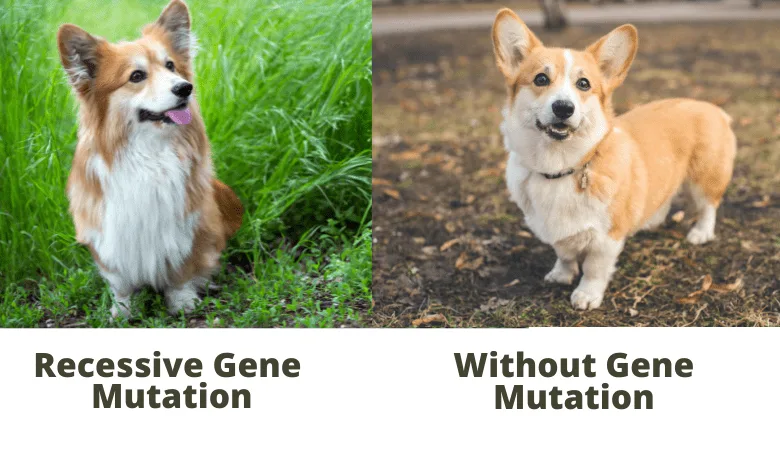Are corgis supposed to be fluffy? If you think your corgi isn’t looking as fluffy as others then this article is for you.
I’ll explain the reasons why your corgi might not be overly fluffy and whether there’s anything you can do about it. Let’s get into it.
Corgis that are not extremely fluffy likely haven’t inherited the recessive gene mutation that causes thick fluff. Other reasons why your corgi isn’t fluffy can include diet, grooming, lifestyle, and overall health.

Table of Contents
Are Corgis Supposed To Be Fluffy?
If we look at the AKC standard for both the Pembroke Welsh Corgi and the Cardigan Welsh Corgi, neither of them are supposed to have fluffy coats. In fact, in terms of show dog criteria, any extreme fluffiness is considered a fault.
What kind of coat do corgis have?
Corgis have double coats with an outer layer that is of medium length. As they are a double-coated breed their overall coat is quite thick and substantial. The Cardigan corgi has a slightly shorter coat than the Pembroke corgi. Still, neither are naturally fluffy.
Why does the AKC consider fluffiness a “fault?”
The AKC has a breed standard that they follow to determine not only a “base standard” for the breed but also for judging purposes when dogs are entered into competitions.
By no means at all does a “fault” mean there is anything actually wrong with overall health.
Fluffy Corgis Have a Recessive Genetic Coat Mutation

So, what on earth does that mean? I will keep it simple without getting too geeky.
Fluffy corgis are bred unintentionally and are normally unexpected. why?
Simply put, the parents of a fluffy corgi, may not be fluffy corgis themselves. They may just be individual carriers…
- In order to be a fluffy corgi, the corgi must inherit two recessive gene mutations, one from each parent…
If that happens, then voila! you get a fluffy corgi.
However, say only the mother carries the gene mutation and the father doesn’t. The offspring will only have one recessive gene mutation from its mother, and will therefore simply end up being a “carrier” instead of having a fluffy coat.
Eventually, you will get two corgis (male and female) who are both individual “carriers” of the gene, without being fluffy themselves. If they produce a litter together, that’s when you end up with a fluffy corgi. Due to the offspring having inherited the gene from each mother and father.
What causes this genetic mutation in the first place? This one is easy, no one knows!
Popular Read: How to help your corgi lose weight! 5 Tips every owner should know
Can You Make Your Corgi Fluffier?
I know what you are thinking, you have a corgi who doesn’t have the gene mutation but are wondering if you can still achieve the super fluffy look.
Honestly, It will be very hard to achieve the same look as a corgi with the fluffy gene mutation.
But there are, however, some best practices to know for looking after your corgi’s coat that will keep it strong, moisturized, soft, and shiny, which will help the fluffy appearance to some degree.
1. Don’t bathe her too frequently
Ironically, over-bathing can eventually keep your corgi dirtier than it can cleaner. And it has numerous negative effects on her coat and skin health.
Frequent use of shampoo will strip away her essential natural oils and will make her coat become dull, dry, and flat. Shortly after her body realizes this change, she’ll naturally produce A LOT of natural oil to help her dry skin and coat.
Unfortunately, it’s always too much, too soon and now your corgi will have an overly greasy coat leading you to think she needs another bath… And the cycle repeats.
Stick to bathing 3-4 times per year and always use a natural-ingredient shampoo that avoids the use of harsh chemicals, detergent, parabens, and alcohol.
2. Stick to a brushing routine
I heard you gulp… you don’t have a brushing routine? Let’s get that sorted now 🙂
Corgis have thick double coats and should receive brushing 2-4 times per week, for around 20 minutes each session.
Start for 10 minutes with a simple undercoat rake for the purpose of de-shedding and then finish off the last 10 minutes with a slicker brush that will focus on the topcoat. This combination has never failed me in years, and I’m used to brushing huskies!
Regular brushing will work many wonders from keeping your floors hair-free, your corgi cleaner, and yes, it will keep her coat in optimal condition and appearance (meaning soft and fluffy).
- You might wanna read why we don’t recommend the FURminator for corgis here.
3. Switch to kibble that uses salmon for its protein
After having made this switch years ago with my dog, it’s only salmon or other types of fish from here on out.
After finding out that chicken, beef, lamb and pork are all common allergens, it made more sense why my labrador was not digesting his food very well.
Salmon is easier digesting, and it isn’t an allergen. Why does this make a difference? Well, overall health and diet are extremely important for skin and coat health. And in order to have a beautiful coat, it starts from within.
By switching to salmon-based kibble, it reduces overall allergen intake, allows for better digestion and therefore more nutrients are successfully absorbed into the body.
Not only did this help, but salmon naturally has a high content of essential fatty acids like Omega 3, Omega 6, and DHA which as it happens are incredible for skin and coat health.
After a month of settling into the new salmon-based kibble, my lab was healthier in general and it definitely showed through his improved coat and skin.
Switching kibbles can be challenging, but I urge you to consider it. And remember, it’s best to talk to your veterinarian for guidance beforehand.
4. Consider a flaxseed or fish oil supplement
Before trying this it is recommended to have a health check-up performed by a trained veterinarian to see if a fish oil supplement will be safe for your corgi.
Typically fish oil supplements are safe and it’s actually one of the most common additional supplements added to a dog’s diet.
Fish oil has wonderful benefits from improved immune system support, brain function, heart health, eye health, and of course, skin and coat health.
Fish oil supplements are well-documented to improve the coat and skin for most dogs.
But as mentioned, please speak to your veterinarian beforehand.
Flaxseed oil is a similar alternative.
Popular Corgi Articles:
● Can Corgis Be Left Home Alone?
● Why Jumping Is Really Bad For Corgis
● Why Do Corgis Bark So Much?
Last Thoughts
If your corgi isn’t fluffy, it’s likely because she doesn’t contain the two recessive genetic coat mutations that make corgis extremely fluffy.
The breed standard doesn’t consider the coat of a corgi to be fluffy anyway, so it’s going to be fairly challenging to achieve this look if your corgi doesn’t possess the special fluff-gene, to begin with.
Maintaining a good brushing routine, ensuring you don’t over-bathe her, and keeping on top of her diet and nutritional needs is all you can do to keep her coat healthy. And if your corgi is destined to have a fluffy coat, it will only happen once she’s healthy.
Most Recommended For Corgis
Best Online Training Program
Brain Training For Dogs has become increasingly popular with working dogs in the last few years and is now recognized as one of the best ways to train dogs in the most stress-free, positive way.
Best Brushes For Shedding
To maintain your corgi’s shedding, you’ll need a regular brushing routine and the right kind of brushes. A simple Undercoat Rake and a Slicker Brush are by far the two best brushes to keep the hairs at bay.
Best Low-Calorie Treats
Keep your corgi at the correct weight by switching out the high-calorie treats and opting for something healthier. Zuke’s Mini Naturals contain only 2 calories per treat and are made from natural ingredients, making these some of the healthiest treats on the market.
Back to more Corgi articles >>
